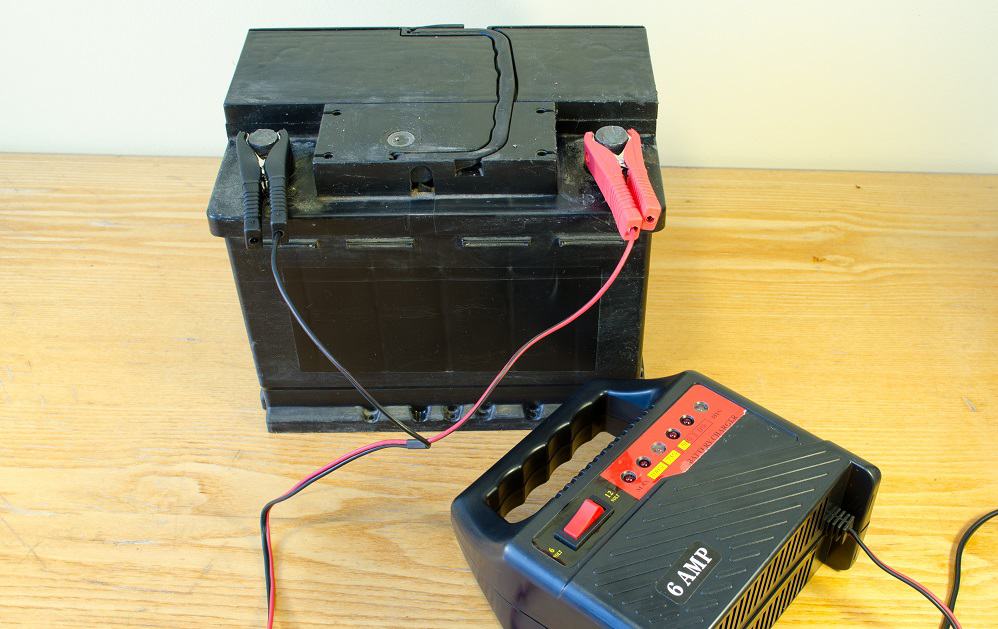Last Updated on March 9, 2023 by Ryan
Yes, it is possible to overcharge a car battery. An overcharged battery can cause excessive heat and gassing inside the cells, leading to permanent damage. It can also lead to corrosion of the internal parts due to acid build-up from electrolysis from prolonged charging at too high a voltage.
This reduces the lifespan of your battery and may even make it unusable. To prevent this, you should always use an appropriate charger with a timer or cut off switch that will sense when your battery has reached full charge and turn itself off before overcharging occurs.
- Step 1: Locate the Battery – Before attempting to overcharge a car battery, you must first locate it
- In most cars, the battery is located in the engine compartment and will be connected to several cables and wires
- Step 2: Safety Precautions – Before beginning work on any vehicle, safety precautions should be taken
- Wear protective eyewear and gloves before handling any type of automotive electrical components such as batteries
- Step 3: Disconnect Negative Terminal – Once you have located the car’s battery, disconnect its negative terminal using an adjustable wrench or pliers
- This will prevent any electric shocks or short-circuiting while working with the battery
- Step 4: Connect Charger Clamps – Attach one of your charger clamps to each terminal of the car’s battery; this will provide power from your charger directly into the battery itself for recharging purposes
- Make sure that both connection points are secure and tight so no current leakage occurs during charging process
- Step 5: Set Charger Settings – Most chargers come equipped with settings for voltage levels and amperage rates for different types of batteries; refer to your manufacturer’s instructions for specific details about setting up these parameters correctly according to your application needs (e
- , 6V/12V)
- Step 6: Start Charging Process – Finally turn on your charger by following all necessary instructions provided by its manual; monitor progress throughout entire charging process until desired results are achieved without exceeding time limits or overcharging capacities of individual cells within unit itself (overcharging can lead to permanent damage)
What Happens When You Overcharge A Car Battery?
Is It Ok to Leave a Car Battery Charger on Overnight?
It is generally not recommended to leave a car battery charger on overnight. This is because the charger may have difficulty accurately and safely determining the charge state of the battery, which can lead to overcharging or undercharging. If your car battery is not properly charged, it can result in decreased performance and even damage to other components if left unattended for too long.
Additionally, leaving a charger plugged in while it’s not actively charging could cause an increased risk of fire due to faulty wiring or shorting out electrical components. If you need to keep your car batteries charged up overnight, opt for trickle chargers that are designed with safety features such as automatic shutoff when full charge has been reached.
What Happens If You Leave a Car Battery Charger on Too Long?
Leaving a car battery charger on too long can have serious consequences. Overcharging the battery can cause irreversible damage, such as bulging or cracking of the cell casing and corrosion of the terminals. This will eventually lead to premature failure of the battery, rendering it useless.
In addition, leaving a car battery charger on too long increases its temperature significantly, which in turn reduces its lifespan due to accelerated degradation of internal components. To avoid these issues, be sure to monitor your charging times closely and only leave your car’s voltage regulator connected for as long as absolutely necessary.
Can a 12 Volt Battery Be Overcharged?
Yes, a 12-volt battery can be overcharged. Overcharging occurs when the charging rate is greater than what the battery can absorb, resulting in an excessive level of voltage or current. This can cause damage to the battery and reduce its lifespan by significantly reducing its capacity to hold a charge.
To prevent this from occurring, it is important for users to use only chargers that have been specifically designed for their particular type of 12 volt battery. Additionally, if using automatic chargers with multiple settings, users should ensure that they are selecting the appropriate setting for their 12 volt battery before connecting it to power.
Can You Overcharge a Car Battery at 10 Amps?
Yes, you can overcharge a car battery at 10 amps. However, it is not recommended as it is likely to damage the battery and reduce its lifespan. Overcharging can cause electrolyte stratification in flooded lead acid batteries, leading to decreased performance.
The risk of overcharging increases when using an unregulated or poorly regulated charger set too high for the capacity of your battery. To avoid this problem, use a charger with appropriate charging parameters and regularly check that the charge rate does not exceed 10 amps.

Credit: shrinkthatfootprint.com
Can You Overcharge a Car Battery at 2 Amps
It is not recommended to overcharge a car battery at 2 amps. Overcharging causes the battery cells to become damaged due to an increase in temperature and gas production, which can lead to permanent damage of the battery. If you find that your car’s battery needs more than 2 amps for charging, it may be time for a replacement.
Can You Overcharge a Car Battery With Trickle Charger
Yes, it is possible to overcharge a car battery with a trickle charger. Overcharging occurs when the battery voltage rises above its normal charging voltage, causing the sulfuric acid in the battery to break down and evaporate. This process can damage both the cells of your battery and shorten its life span drastically.
To prevent overcharging, make sure you use an appropriate trickle charger that automatically stops charging once the desired level of charge has been reached.
How to Fix Overcharged Battery
If you notice that your battery is overcharged, the best thing to do is unplug it from its charger as soon as possible. This will stop the flow of electricity and prevent any further damage to the battery. If this doesn’t work, check for any broken wires or loose connections on both ends of the charger cable.
You may also need to replace the charger itself if it’s been damaged by an overcharge. Finally, inspect your device for signs of heat damage caused by an excessive charge cycle; if present, you should take it in for repairs as soon as possible.
Conclusion
In conclusion, it is important to remember that overcharging a car battery can be very dangerous and should always be avoided. Damage caused by too much charging can cause your battery to fail prematurely or even explode in some cases. It is best practice to charge your car’s battery only when necessary, using the correct charger for the job and never leaving it unattended while plugged in.
If you think your battery may have been overcharged or are worried about any other issues with it, make sure to take it into a trusted mechanic as soon as possible.



